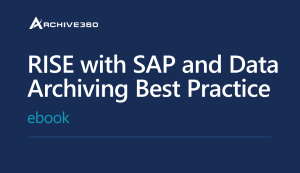Data Volume Management (DVM) is a crucial strategy for organizations using SAP systems, aiming to maintain optimal performance, reduce costs, and ensure regulatory compliance. Data archiving as a core component of DVM offers several significant benefits.
Performance Optimization: As businesses grow, so does the volume of data within SAP systems. Over time, this can lead to degraded database performance. Data archiving mitigates this by offloading inactive or less frequently accessed data from the primary database to an archive storage system, and enables faster transaction times, improved system responsiveness, and enhanced system performance. By keeping the most relevant data in the active database, organizations can ensure their systems run efficiently and support business operations optimally.
Cost Reduction: The storage and maintenance of large data volumes in high-performance databases can be expensive. Data archiving significantly reduces storage costs by moving non-essential data to less expensive storage solutions. This frees up valuable space in the primary database and also lowers the total cost of ownership (TCO) for data management. Additionally, archiving optimizes database reorgs providing even greater transaction performance for end-users.
Compliance and Legal Requirements: In industries where regulatory requirements mandate data retention for specific periods, data archiving ensures securely storing data in archive files. When SAP customers use PBS Software “add-ons”, detailed data is easily retrieved by end-users through familiar transactions and reports. SAP archiving solutions coupled with PBS Software solutions provide robust tools to maintain data integrity, security, and accessibility, which are essential for audits and other compliance-related activities. This not only safeguards organizations against legal penalties, but also builds trust with customers and stakeholders by demonstrating responsible data management practices.
Enhanced Data Governance: Effective data governance involves ensuring data accuracy, accessibility, and security throughout its lifecycle. SAP Data Archiving is a key component of a comprehensive data governance strategy. By systematically managing the lifecycle of data—from creation and active use to archival and eventual disposal—organizations can maintain better control over their data assets. This enhances data quality, reduces redundancy, and supports efficient data retrieval and usage, fostering a culture of data-driven decision-making.
Business Continuity and Risk Management: Archiving data also plays a vital role in business continuity planning and risk management. In case of a system failure, having a well-structured archive ensures that critical data is quickly restored, minimizing downtime and disruption. By reducing the load on the primary database, archiving helps in maintaining system stability and reliability, reducing the risk of performance-related issues.
Many companies consider experienced SAP Data Archiving consultants crucial for initiating effective archiving strategies. However, while many organizations offer services, skills, and tools to support data management operations, successful data archiving and ensuring end-user access to archived data are best achieved through consultants with specialized expertise and the use of solutions from providers like PBS Software Americas.
SAP Data Archiving capabilities is a core part of Data Volume Management in organizations seeking to optimize performance, reduce costs, ensure compliance, and maintain effective data governance. By implementing robust archiving solutions, businesses can achieve greater efficiency, reliability, and scalability in their SAP environments, driving overall operational excellence and sustainable growth.






